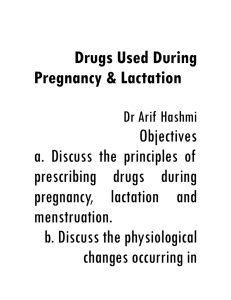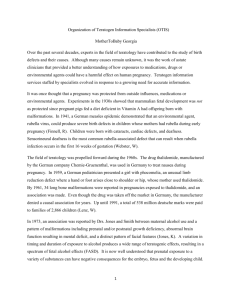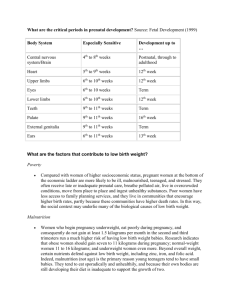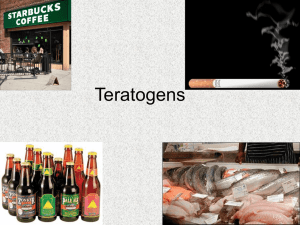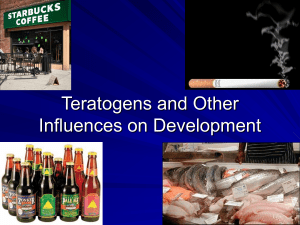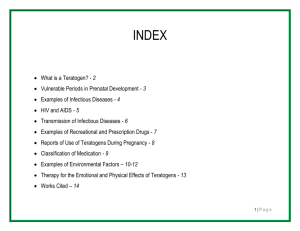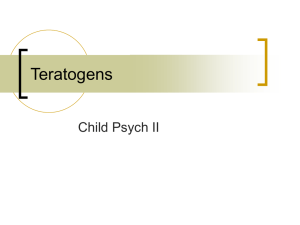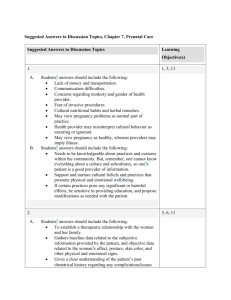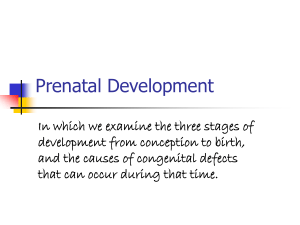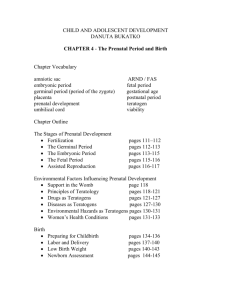HUMAN TERATOGENS - Teratology Society
advertisement
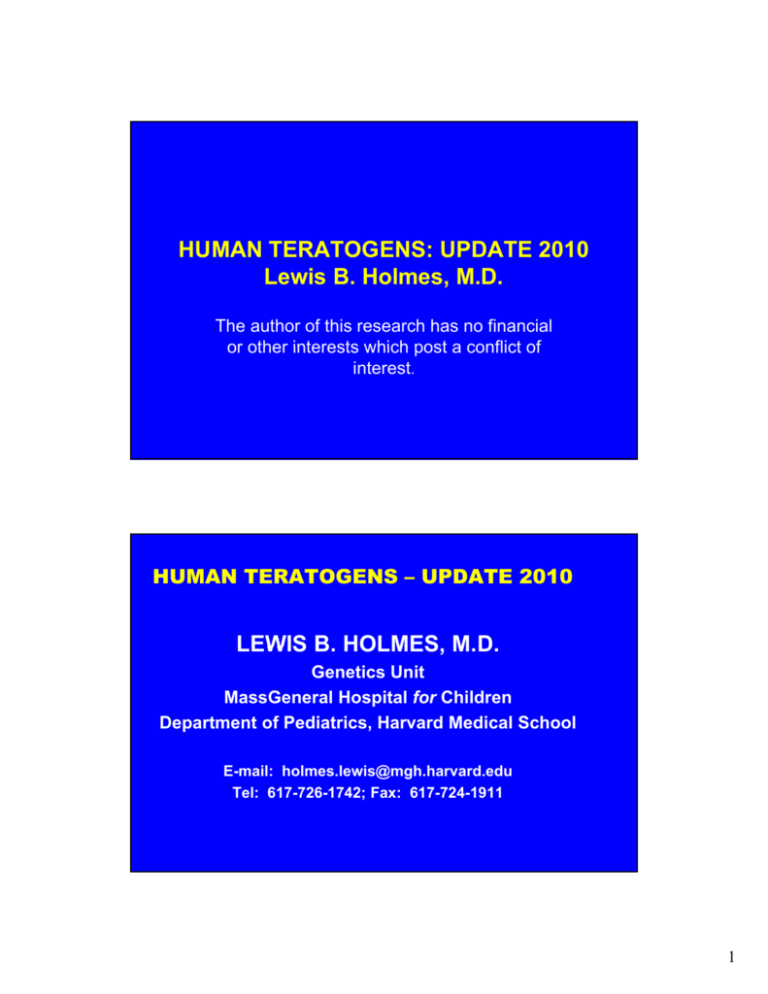
HUMAN TERATOGENS: UPDATE 2010 Lewis B. Holmes, M.D. The author of this research has no financial or other interests which post a conflict of interest. HUMAN TERATOGENS – UPDATE 2010 LEWIS B. B HOLMES, HOLMES M.D. MD Genetics Unit MassGeneral Hospital for Children Department of Pediatrics, Harvard Medical School E-mail: holmes.lewis@mgh.harvard.edu Tel: 617-726-1742; Fax: 617-724-1911 1 DEFINITION OF A TERATOGEN An exposure in pregnancy that has a harmful fetal effect. RECOGNIZED HUMAN TERATOGENS 1. DRUGS: Ex. anticonvulsants methimazole retinoic acid (Accutane) warfarin 2. HEAVY METALS: Ex. lead mercury 3. RADIATION: cancer therapy; nott diagnostic di ti X-rays X 4. MATERNAL CONDITIONS Ex. insulin-dependent diabetes, cigarette, smoking, alcohol abuse 5. INTRAUTERINE INFECTIONS Ex. toxoplasmosis rubella varicella 6. PROCEDURES Ex. CVS D&C ICSI amniocentesis i t i 7. OTHER Ex. hypotension misoprostol heat 2 HUMAN TERATOGENS UPDATE - 2010 1 CHARACTERISTICS OF A HUMAN TERATOGEN 1. 2. INFORMATION SOURCES 3. MAJOR LIMITATIONS IN KNOWLEDGE 4. DIFFICULTIES IN COUNSELING CHARACTERISTICS OF A HUMAN TERATOGEN 1. An increase in the frequency of an abnormal fetal effect; 2 2. A dose-response relationship; there is a threshold below which the exposure is not teratogenic; 3. Period of greatest sensitivity; 4. Established mechanism of action, which often requires animal model; 5. The proposed teratogenicity must make sense biologically; 6. Identifying a genetically more susceptible group. 3 POTENTIAL FETAL EFFECTS Spontaneous abortion Maternal diabetes Growth restriction Alcohol Pattern of major and minor Anticonvulsant drugs, drugs anomalies Warfarin, retinoic acid Major malformations only Cigarette smoking Stillbirth Maternal diabetes Abruptio p p placenta Cocaine Cognitive dysfunction Retinoic acid, PCB phenobarbital, lead Altered social behavior Diethylstilbestrol (DES) Cancer DES 4 EPIDEMIOLOGIC STUDIES: CASE-CONTROL EX. Sodium valproate-exposed pregnancies showed increased risk of spina bifida: Odds Ratio: 20.6 (p < 0.000001) Ref: Robert E, Guibaud P: Lancet 2:937 and 1096, 1982. PROBLEM: A case-control study focuses on only selected effects; does not describe the spectrum of fetal effects. 5 EPIDEMIOLOGIC STUDIES: COHORT STUDY EX: Anticonvulsant drugs Exposed and unexposed infants examined systematically to determine the spectrum of physical effects Midface and Digit Hypoplasia Major malformations Microcephaly Growth restriction Ref: Holmes LB et al: N Engl J Med 344:1132-8, 2001 THE THRESHOLD DOSE CONCEPT -- there th is i for f some teratogens t t a level l l off exposure below which there is no harmful fetal effect. Brent RL: Teratology 34:359-360, 1986 Gaylor DW et al: Teratology 38:389-391, 1988 6 DOSE-RESPONSE RELATIONSHIP Valproic acid: Omtzigt JGL et al: Neurol 42 (Suppl 5):119,92 VPA conc. mg/l Peak dose admin. Infants with spina bifida (n=5) 73.4 ± 25 650 ± 124 Exposed, but normal (n=84) 43.9 ± 21.6 p=.023 384 ± 19 p=.002 Also, see Mawer G et al: Seizure 11:512-18, 2002 7 CIGARETTES (mg nicotine/day) NONE 0 Light >0 to <16 Heavy ≥16 Sample Size 64 45 p value Mother’s current Smoking (cig/d) Family income (x$1,000) Child’s age (yrs) 04 0.4 81 8.1 16 5 16.5 0 001 0.001 57.2 58.0 45.8 0.01 14.6 14.5 14.7 115 ± 14.3 109.1 ± 12.4 103.2 ± 11.8 0.001 Reading 114. 110. 107. 0.01 Spelling 107. 104. 102. Arithmetic 102 98. 94. General IQ 36 0.05 From Fried P et al: Neurotox Terat 25:427-436, 2003 DOSE-RESPONSE RELATIONSHIP EXAMPLE: ACCUTANE vs. RETIN-A ACCUTANE, taken by mouth, increases fetal level of all-transretinoic acid; 35% rate of major malformations and high rate of mental retardation without malformations. RETIN-A, applied topically, has little absorbed and is not teratogenic, i.e. no harmful fetal effect. 8 ACCUTANE (ISOTRETINOIN; 13-CIS-RETINOIC ACID) 35% Have Major Malformations • • • • Conotruncal Heart Defects Cranial Nerve Palsies Absence of Vermis of Cerebellum Moderate to Severe Mental Retardation 25% Of Children With No Malformations Are Mentally Retarded 9 TRETINOIN: TOPICAL EXPOSURE IN PREGNANCY (all trans retinoic acid) CLINICAL STUDIES: Exposed vs. controls showed no increased rate of malformations. REFERENCES: De Wals P et al: Paediat Perinat Epid 5:445-7, 1991 Johnson K et al: Teratology 49:375, 1994 Shapiro L et al: Lancet 350:1143-1144, 1997 10 TRETINOIN CREAM: PHARMACOKINETIC MODEL “Topical Topical application of tretinoin in human beings . . . . Results in an internal exposure that is four to six orders of magnitude lower than a minimally teratogenic dose . . . .” Clewell III III, HJ et al: A physiologically based pharmacokinetic model for retinoic acid and its metabolites. J Am Acad Dermatol 36:S77-S85, 1997. PERIOD OF GREATEST SENSITIVITY: KNOWN FOR FEW HUMAN TERATOGENS Ex. THALIDOMIDE: days 20-34 postfertilization WARFARIN: weeks 4-7 (anticoagulant) METHOTREXATE: weeks 6-8 (chemotherapy) IN GENERAL: 1st trimester: 2nd, 3rd trimester: malformations IQ effect 11 PROPOSED TERATOGENICITY MUST MAKE SENSE BIOLOGICALLY: ONE THAT DID NOT Example: BENDECTIN (VITAMIN B6 AND ANTIHISTAMINE) • SCIENTIFIC EVIDENCE LACKING • DRUG RE-INTRODUCED IN CANADA Brent RL: Reprod Toxicol 13:245-253, 1999. CYP1A1 MspI polymorphism: Genotypes: AA homozygous wild type Aa heterozygous variant type aa homozygous variant type Phase I enzyme: metabolism of chemicals in cigarette smoke GSTT1 gene, a major phase 2 enzyme: (Glutathione S transferase: GST) (Glutathione-S-transferase: Genotypes: AA: present Aa: present aa: deletion 12 CIGARETTE SMOKING, BIRTH WEIGHT, MOTHER’S GENOTYPE: CYP1A1 and GST SMOKING never continuous ALL MOTHER’S GENOTYPE 1. CYPIAI never Aa/aa continuous (MSP1) 2. GSTTI present continuous absent (deletion) “ BLACK p ---264 gms .05 WHITE --309 p -.06 +24 -475 .81 .007 +63 -467 .79 .05 -61 .70 -291 .10 -594 .006 -579 .03 Wang X et al: JAMA 2002; 287:195-202. Chong Y-C et al: J Occ Env Med 2003; 45:392-498 HUMAN TERATOGENS: INFORMATION SOURCES • Literature searches - ACOG Technical Bulletins • Symposia • Postgraduate courses • Annual Meetings - Teratology Society - DW Smith Workshop - Soc Perinatal Epidem • Books • Computer – based databases - TERIS, Reprotox, Shepard’s Catalog • OTIS and ENTIS 13 OTIS - Organization of Teratogen Information Systems Example: Examples: Centers collaborate to identify exposed pregnancies and organize follow-up follow up exams. asthma medication leflunomide (Arava) Outcomes: body and head size, dysmorphic features, major malformations http://www.otispregnancy.org/ HUMAN TERATOGENS: LIMITATIONS • LACK OF KNOWLEDGE - MOLECULAR BASIS - CELLULAR BASIS - EPIGENETIC EFFECTS • NEED SYSTEMATIC STUDIES OF EFECTS ON LEARNING AND I.Q. • NEED STUDIES OF AIRBORNE AND DERMAL EXPOSURS 14 HUMAN TERATOGENS: MECHANISMS OF ACTION WARFARIN*: INHIBITION OF VITAMIN K REDUCTASE PROPYLTHIOURACIL**: BLOCKS CONVERSION OF THYROXINE TO TRIIODOTHYRONINE *Van Driel D et al: Teratology 66:127-140, 2002 **Rosenfeld H et al: Brit J Clin Pharm 68:609-617, 2009 HUMAN TERATOGENS: CELLULAR EFFECTS WARFARIN: Why is nose cartilage affected so dramatically? VALPROATE: Why does the effect on neural tube produce myelomeningocele and not anencephaly? PHENYTOIN: Why are effects primarily on distal phalanges of fingers, but not in the toes? 15 HUMAN TERATOGENS: EPIGENETIC EFFECTS? One example is assisted reproductive technology (ART): 25% of infants with Angelman Syndrome* had imprinting defect with silencing of maternal UBE3A gene. *Ludwig M: J Med Genet 42:289-291, 2005 Cox GF et al: Am J Hum Genet 71:162-164, 2002 ANTICONVULSANTS: EFFECTS ON INTELLIGENCE ISSUES: AGE OF CHILD TESTING INSTRUMENT TESTING PARENTS SELECTION OF MATCHED CONTROL EFFECT OF CONFOUNDERS, e.g. SES 16 Domain PB Effect Significant p value (1-tailed) Verbal Knowledge Yes 0.035 Verbal Memory No Perceptual Organization Visual Memory Yes 0.054 Yes 0.023 Distractibility Yes 0.005 Drawing Ability Yes 0.035 Motor Speed No * Multivariate ANOVAs were performed using SPSS 11.1 HUMAN TERATOGENS: COUNSELING ISSUES • MISINFORMATION: Plague of PDR • INCONCLUSIVE STUDIES: EXAMPLES S Selective Serotonin S Re-uptake Inhibitors (SSRI) (SS ) Phthalates Bisphenol A Tumor necrosis factor-alpha antagonist • FDA’s ADVERSE EVENT REPORTS: HAVE NOT HELPED TO IDENTIFY HUMAN TERATOGENS • EFFECTS OF LITIGATION • HORNS OF A DILEMMA 17 PHYSICIANS DESK REFERENCE (PDR) • Section on risks in pregnancy designed to protect liability. • Two systematic studies showed poor correlation between categories A, B, C, D and X with clinical data available. SEE: Friedman JM et al: Ob Gyn 75:594-599, 1990 Lo WY, WY Friedman JM: Ob Gyn 100:465 100:465-473, 473 2002 Public Affairs Comm (Teratology Society): Teratology 49:446-447, 1994. Kweder S: Teratology 63:270, 2001 18 MOST MEDICATIONS NOT STUDIED FOR FETAL EFFECTS STUDY OF ALL DRUGS APPROVED BY FDA 1980-2000 468 DRUGS: 80% “RISK RISK UNDETERMINED” UNDETERMINED USED ONLINE “TERIS” AS SOURCE POOR CORRELATION OF TERIS RATINGS AND FDA DRUG CATEGORIES (A, B, C, D & X) FOR 163 DRUGS KAPPA STATISTIC = 0.08 ± 0.04 Lo WY, Friedman JM: Am J Ob Gyn 2002; 100:465-473. SSRIs • Celexa (citalopram) • Lexapro (escitalopram) • Luvox (fluvoxamine) • Paxil (paroxetine) • Prozac (fluoxetine) • Zoloft (sertraline) 19 PAROXETINE HYDROCHLORIDE IS A SELECTIVE SEROTONIN SEROTONIN-REUPTAKE REUPTAKE INHIBITOR AND AN ANTIDEPRESSANT. METABOLIZED BY THE CYTOCHROME P-450 (CYP) 2D6 ISOENZYME. COMPLETELY ABSORBED FROM GI TRACT. ELIMINATION HALF-LIFE 21-24 HOURS. SSRIs: ? FETAL EFFECTS GSK Retrospective Study by Ingenix (ctr.gsk.co.uk/welcome.asp) Finding: Possible “signal” for heart defects, esp. ventricular septal defects, in spontaneous reports in GSK Bupropion Pregnancy Registry. atrial septal defect (ASD) coarctation tetralogy of Fallot transposition p of g great arteries ventricular septal defect (VSD) total (all defects)** Bupropion first trimester (n = 463) 0 1 0 0 6 __ 9 Other antidepressants* first trimester (n = 3,241) 4 1 1 1 18 __ 36 * fluoxetine, paroxetine, sertraline, citalopram ** not all specific defects listed 20 SSRIs AND HEART DEFECTS Slone Birth Defects Study: Louik C et al: N Engl J Med 356:26752683 2007 2683, 2007. Any heart defect Septal defects Paroxetine Fluoxetine OR 1.4 0.9 (0.2, 2.5) (0.6, 1.5) 0.8 (0.3, 2.2) RVOTD 3.3 (1.3, 8.8) 1.2 (0.5, 2.2) 1.0 (0.2, 3.4) Sertraline 1.5 (0.9, 2.5) 2.0 (1.2, 4.0) 2.0 (0.6, 6.8) No association with anencephaly, omphalocele or craniosynostosis SSRIs AND HEART DEFECTS CDC: National Birth Defects Prevention Study: Alwan S et al: N Engl J Med 356:2684-2692, 356:2684 2692, 2007. All heart defects, all SSRIs – no association Paroxetine RVOTO: OR 2.5 (1.0, 6.0) positive association with anencephaly, omphalocele craniosynostosis 21 SSRI: Questions about fetal effects Evidence of dose-response relationships? Any relevant animal model? Biologic plausibility ANY DRUG – SPECIFIC EFFECTS? A pattern Any tt off dysmorphic d hi features f t or multiple lti l anomalies? li ? Any evidence of over-representation of muscular VSDs or tiny ASDs? HORMONALLY ACTIVE AGENTS: PHTHALATES “PLASTICIZERS”: PLASTICIZERS : PRENATAL EXPOSURE CORRELATES WITH GENITAL EFFECTS IN MALES – TESTIS FUNCTION AND ANOGENITAL DISTANCE Swan SH et al: Environ Health Persp 81:1056-1061, ‘05. Salazar-Martinez E et al: Environmental Health 3:8-14, ’04. 22 Measuring Anogenital Distance TUMOR NECROSIS FACTOR ANTAGONIST (TNF-α): ? NEW TERATOGEN 1. Analysis of Adverse Event Reports at FDA: NOT HELPFUL Carter JD et al: J Rheumatol 36:635-641, 2009 2. OTIS Findings promising ? Major teratogen 23 FDA: ADVERSE EVENT REPORTS USE TO IDENTIFY HUMAN TERATOGENS FALSE ALARMS: - TOPICAL TRETINOIN → HOLOPROSENCEPHALY FRANZ ROSA NO: De Wals et al: Paediat Perinat Epid 5:445-7, 1991. - STATINS → Edison RJ, Muenke M: N Engl J Med 350:1379-82, 1991 NO: Petersen EE et al: AmJ Med Genet 146A:2701-5, 2008 Selected MMF-Exposed Cases Le Ray et al., 2004 Perez-Aytes et al. 2008 Tjeertes et al., 2007 Velinov and Zellers, 2008. 24 PREGNANCY REGISTRIES: COMPANY BASED: • Antiretroviral Drugs in Pregnancy Registry: • VARVAX Pregnancy Registry • Lamotrigine Pregnancy Registry HOSPITAL-BASED : • Isotretinoin Pregnancy Registry • National Transplant in Pregnancy Registry • North American AED (antiepileptic drug) Pregnancy Registry NEED: NATIONAL CENTER TO ADVISE TERATOGEN COUNSELING: VALPROATE Patient: 12 weeks GA, taking 1,500 mg/day Issues: Misinformation (“Its just spina bifida. Take your folic acid and don’t worry.”) Risk for developmental delay: hard to quantify Risk for autism: unknown rate Prenatal screening: not much help Change medication: ? 25 “NEW” TERATOGEN? SULFONAMIDE: ASSOCIATIONS ANENCEPHALY : OR 3.4 (95 CI : 1.3 – 8.8) HLHS : OR 3.2 (95 CI : 1.3 – 7.6) COARCTATION OF AORTA : OR 3.2 (95 CI : 1.3 – 5.6) NITROFURANTOIN: ASSOCIATIONS ANOPHTHALMIA/MICRO- : OR 3.7 (95 CI : 1.1 – 12.2) HLHS : OR 4.2 (95 CI : 1.9 – 9.1) CLEFT LIP/PALATE : OR 2.1 2 1 (95 CI : 1.2 1 2 – 3.9) 3 9) METHOD: NBDPS – 13,155 MALFORMED; 4,941 CONTROLS CRIDER KS ET AL: ARCH PEDIATR ADOL MED 163:978-985, 2009. T.V. ADVERTISEMENT – BOSTON, 2007 ATTORNEY MARK _________ If you took Paxil while pregnant and had a child with a heart defect or pulmonary hypertension, call Attorney Mark ________ at 617-___-____. 26 TERATOLOGY SOCIETY CHALLENGE EDUCATE, EDUCATE, EDUCATE Opportunities at annual meetings ? Updates on specific exposures ? Annual symposium Send your students to Human Teratogens Course in Boston ADVERTISEMENT: Human Teratogens Postgraduate Course SUNDAY, MAY 1 – TUESDAY, MAY 3, 2011 Massachusetts General Hospital Fee: $575 $325 To Register: Harvard Med-CME http://cme.med.harvard.edu/courses/humanteratogens For Information call: Physicians Nurses, nurse midwives, genetic counselors Special arrangements available for students Rosanna Greco (Course Coordinator) Tel: 617-726-1742 or E-mail: Rgreco@partners.org 27 THE CHALLENGE “The problem with communication … is the illusion that it has been accomplished.” George g Bernard Shaw 28
